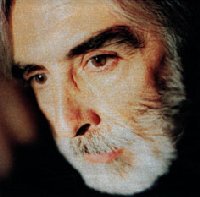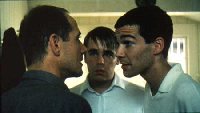 |
Vol 0, No 5
26 October 1998 |
|
|
De-icing the Emotions Michael Haneke's retrospective in London Andrew J Horton When a director announces "I wish you a disturbing evening" before the showing of his latest film, you probably are not in for an easy ride. If he says it with cheerful abandon, you have all the more reason to take him seriously, or so discovered Londoners attending the recent retrospective of five films by the controversial existentialist director Michael Haneke, part of the Festival of Central European Culture. Haneke, who studied philosophy at Vienna University, talks about his films using long barely translatable German words that make you wonder if discussing his work in English is at all possible: Entfremdung (alienation from oneself), emotionale Vergletscherung (emotional glaciation) and Entwirklichung (reality losing its sense of realness). Behind these fearsome expressions, Haneke's films are very immediate and comprehensible, although by no means simplistic. He is concerned with a society that no longer knows how to love - or for that matter how to hate. His films are an attempt to resharpen our feelings and responses to the world around us, which have been blunted, especially by the media. Rejecting standard conventions of timing , build up of suspense and logical plotting, he is not worried about inducing boredom, irritation and frustration. Haneke repeatedly draws us into the cinematic medium, as any film seeks to do, but then breaks the illusion to show us how we have been seduced and tricked, and what willing accomplices to it we were.
With several literary adaptations already behind him, and such excellent existentialist credentials, you would think Haneke would be the ideal man to interpret Kafka's Das Schloss (The Castle, 1995). Curiously, though, Haneke's screen adaptation is his weakest film to date. It feels rushed and hectic, a far cry from both his first film and the texture of Kafka's original novel. Ultimately, it adds little to our understanding of either Kafka or Haneke.
As the duo try to entertain us by playing their games with the family, Haneke plays games with us in order to awaken us to the senselessness of the increasing lust audiences have for blood on the cinema screens. He builds up tension and then destroys it. He gives us what we want and then takes it away. He pulls us out of our comfortable cinema seats and forces us to recognise our role as protagonists in the film and de facto initiators of the bloodshed. The ultimate object is to restore to violence its real properties, as opposed to its cinematic ones, and to faithfully represent the very real suffering and distress that actual violence causes.
Funny Games is a genuinely shocking and discomforting film. In shattering preconceptions and by confronting you with your darker, more bloodthirsty nature as a cinema viewer, it goes much further than other films tackling the issue of violence, such as Peter Greenaway’s The Cook, the Thief, His Wife and Her Lover. This is not a film to be easily dismissed, particularly since it is currently making its way around Europe and could well be appearing at a cinema near you shortly. I, too, wish you a disturbing evening. Andrew J Horton, 26 October 1998 (republished 22 November 1999)
|
|
![]()
Copyright (c) 1999 - Central Europe Review and Internet servis, a.s.
All Rights
Reserved



